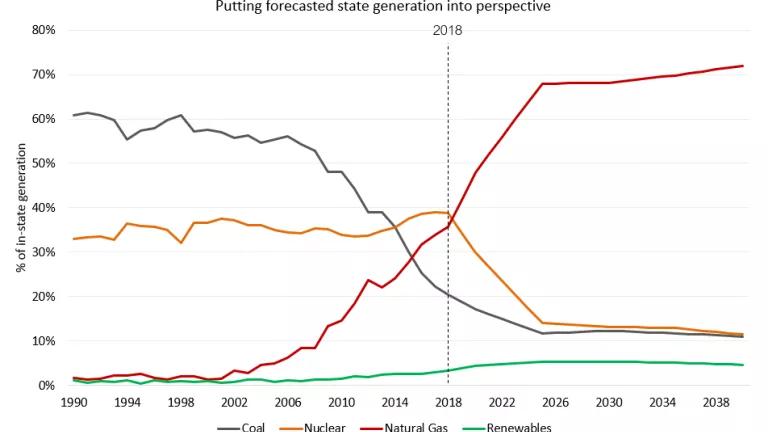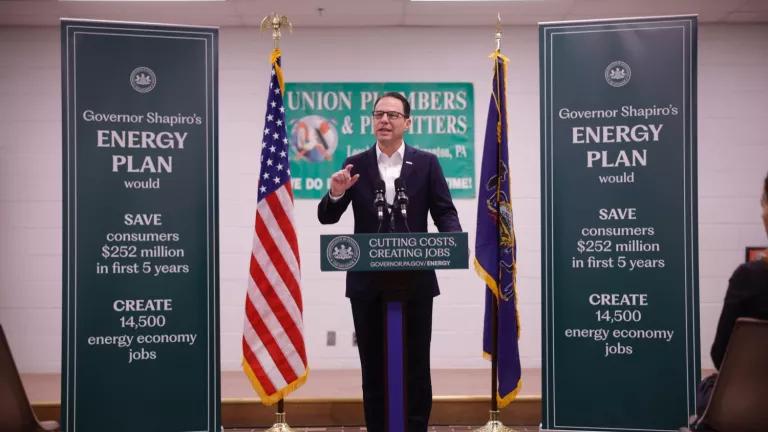PA Bill Would Block Local Efforts to Clean Up Buildings
After an extra dark, long, COVID winter, the trees are finally in bloom and the birds are singing. Unfortunately, it’s also the season when bills that would stifle Pennsylvania’s transition to a brighter clean energy future are popping up in the General Assembly like mushrooms in a cow pasture after spring rain.

This blog was guest-authored by Jackson Morris, Eastern Region Director for NRDC's Climate and Clean Energy Program.
After an extra dark, long, COVID winter, the trees are finally in bloom and the birds are singing. Unfortunately, it’s also the season when bills that would stifle Pennsylvania’s transition to a brighter clean energy future are popping up in the General Assembly like mushrooms in a cow pasture after spring rain.
Senate Bill 119—which if enacted would not only prevent Governor Wolf from joining the highly successful RGGI program to cut carbon from power plants and invest in clean energy jobs, but from regulating carbon in any manner without further legislative approval—may be the most egregious example. But it's hardly an outlier. This week SB 119 will compete for attention in the Senate with SB 284, an attempt to saddle renewable energy projects with onerous bonding requirements, and—the subject of this blog—with SB 275, a bill to prevent local governments from driving building decarbonization in Pennsylvania's cities, boroughs, and townships.
We can’t meet our climate goals without cleaning up all sectors of the economy—including buildings
Pennsylvania lags beyond many states in terms of overall climate action, but the administration Governor Tom Wolf is working to change that, from the aforementioned push to join RGGI to a recent nation-leading procurement of solar to power government buildings. But in order to reduce the state’s greenhouse gas emissions by 2050 at the pace the latest climate science demands, we’ll need to play a much deeper decarbonization game. Mostly, that means (1) making our homes, businesses, factories and vehicles more energy-efficient; (2) getting more of our power supply from clean sources like wind and solar; and (3) powering our cars, trucks and buildings with that increasingly clean electricity supply. The state DEP’s recent 2021 Climate Impacts Assessment report is only the latest reminder of the need for urgent action.
The gas industry doesn’t want climate policies adopted by local governments to cut into their profits
As my colleagues Alejandra Mejia and Kimi Narita explain at length in this comprehensive blog post, no fewer than 18 state legislatures have enacted, or are in the process of advancing legislation to block municipalities from enacting one important policy for ensuring that new buildings are equipped for electric heating and cooling, rather than burning methane gas: prohibiting gas hookups in new construction.
Now this well-funded and highly sophisticated national campaign being led by the American National Gas Association has come to Harrisburg. On Tuesday, May 11 the state senate Local Government and Environmental Resources & Energy Committees will hold a joint hearing on Senate Bill 275 (which is essentially the same bill the gas industry has been pushing out, in cookie-cutter fashion, throughout the U.S.)
Solution Looking for a Problem
SB275 isn’t just bad policy—it’s a waste of taxpayers’ time and money. Fossil-friendly elected officials pushing it (led by my own Senator Gene Yaw, unabashed booster of Pennsylvania’s gas industry and opponent of clean energy and climate progress) are doing so in a state where a grand total of ZERO municipalities have adopted such a policy. But that fits the strategy of this insidious national campaign: build fortifications around gas before clean energy even reaches the city gates. The legislators supporting this effort would serve their constituents’ interests better by focusing on the essential economic recovery and clean energy job creation the state so desperately needs right now.
What’s Next
We’ll be tuning into the hearing and ensuring all members of the Senate and House are well aware of why this bill is not only premature, but also terrible precedent and bad public policy generally. It remains to be seen if the bill will ultimately receive a floor vote in the Senate or pick up steam in the House. If it were to make it to Governor Wolf’s desk, he should veto it, as it’s antithetical to all his other climate leadership. Looming in the background is the possibility that the Republican-controlled General Assembly will try to tuck it into the Fiscal Code (one of the catch-all bills that make up the state budget) in June, in hopes that will tie the governor’s hands. We’ve seen that movie before, but we’ll be working hard to ensure a happier ending. Stay tuned…



